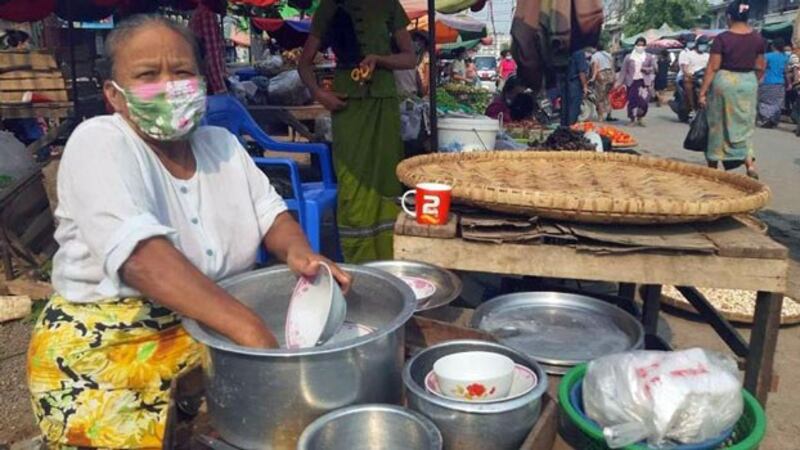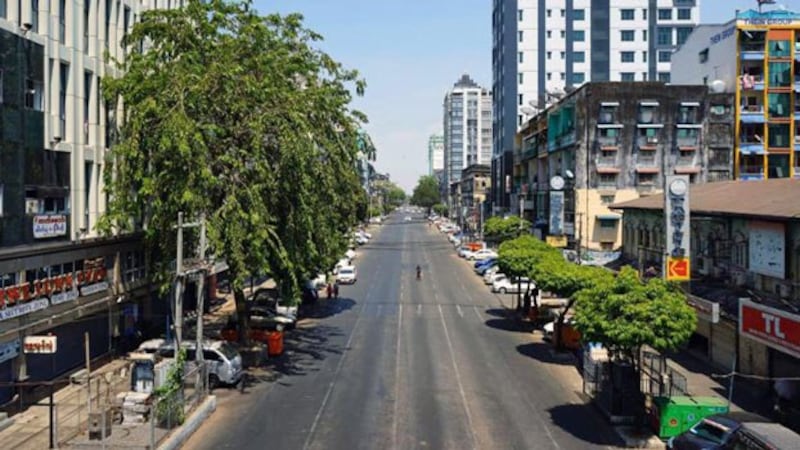A Myanmar doctor who treated a coronavirus patient has tested positive for the deadly pathogen, according to Myanmar's Health Ministry, raising concerns over the safety of health care workers who are exposed to COVID-19 amid its spread in the Southeast Asian country,
As of Thursday, Myanmar registered a total 85 confirmed cases and four fatalities, the ministry's figures indicated.
A 58-year-old anesthesiologist at Pyay General Hospital in central Myanmar’s Bago region has become the first doctor to catch COVID-19. She was part of a medical team that treated a man known as patient No. 17, who died on April 8.
The man — an administrator of Bago’s Paukkhaung township — had caught the virus from his wife, a nurse who works at an international medical center in the commercial capital Yangon, and who is known as coronavirus patient No. 15. The man’s two children and a niece who lived with the couple also tested positive.
The anesthesiologist, whose name has been withheld, is the only medical professional from the team who treated patient No. 17 to test positive for the virus. She was transferred to Waibargi Hospital, a Yangon medical facility that specializes in infectious diseases, on April 12, a day after she tested positive.
“It has become more risky for us now,” said Dr. Naw Thandar Swe from Yangon’s Insein Township Public Health Department. “We are going to work just for the benefit of many people, but we are at risk of infection.”
He urged all citizens to comply with safety measures, such as government-ordered lockdowns, frequent hand-washing, and the wearing of face masks in public to reduce the spread of the virus and the chance of infecting health care workers.
“All citizens should protect themselves so they do not burden public services,” he said. “They should take the rules seriously. We should help and support one another because this is a long-term commitment.”
Dr. Kyaw Htet Aung from Sinphyukyun Hospital in central Myanmar’s Magway region said there are concerns over the workloads of doctors and nurses amid the coronavirus pandemic because of the very low ratio of government-hired medical practitioners to the population in Myanmar.
“We already had expected that doctors from the front line could get infected sooner or later,” he said.
“Who would take care of incoming patients if most of the front-line medical staff becomes infected and is gone?” he asked. “[This is] a pressing concern for all medical professionals.”
During a videoconference discussion with front-line medical personnel from Mon state on April 15, State Counselor Aung San Suu Kyi said that the prevention, protection, and treatment of the coronavirus would remain a challenge for many days to come.
“It will still be challenging for the next two, three, or four weeks,” she said. “I don’t intend to scare you. You should all be prepared. [As] for the Ministry of Health, we will try our best to provide effective and correct medical treatments. [As] for the public, you should comply with the guidelines.”

Mandatory masks in markets
Other parts of the country meanwhile are ramping up their efforts to curb the spread of COVID-19.
Authorities in the central Myanmar city of Mandalay have ordered residents to wear face masks at public markets as a further measure against the spread of COVID-19, with most vendors — but not most shoppers — complying with the directive, stall operators and a market manager said.
The rule applies to all markets regulated by the Mandalay City Municipal Department (MCDC), and those who fail to comply banned from entering and doing business in the markets.
“The markets cannot be closed because they supply necessary commodities for the public,” said Yu Yu Lwin, manager of the Aung Tharyar market in Chanmaythazi township, who posted notices about the regulation at market entrances.
“We’re also giving free face masks to shoppers who don’t know about the new rules,” he said.
So far, vendors are following the new rule because they must deal with market management staff, but shoppers are another story, Yu Yu Lwin said.
“Shoppers are not complying with the rules,” he said. “We have installed public sinks for handwashing. Most vendors use them to wash their hands.”
Mandalay’s mayor, Ye Lwi, posted a reminder to city dwellers about the mandatory face mask requirement on his Facebook account on Monday.
Than Tin, another vendor, said those who violate the order are subject to fines.
“They have ordered us to wear the face masks and not to interact closely with shoppers,” she said. “They can fine us for violating the rule.”
Mandalay authorities have provided two cloth face masks to vendors for everyday use, while some local humanitarian groups are donating masks to others, market vendors said.
“We are wearing face masks and hand gloves now,” said vendor Khin San Win.
Face masks usually sell for around 100 kyats (seven U.S. cents) in Myanmar, but after the announcement of the first confirmed coronavirus case on March 23, the price shot up to 500 kyats (U.S. $0.35). In Mandalay, the masks currently sell for about 300 kyats (U.S. $0.21) each.
The government has put in place another new nationwide measure that takes effect Friday to prevent the further spread of the virus, the Myanmar Times reported.
It bans gatherings of five or more public servants, corporate employees, and factory workers when commuting to and from work, when shopping at permitted markets and malls, and when using delivery services and legal services.
Those who fail to comply with the government directive can be charged under the country’s 1995 Prevention and Control of Communicable Diseases Law, which carries a prison sentence up to six months, a fine of up to 50,000 kyats (U.S. $35), or both.

An uneventful Thingyan
The government has banned all public gatherings throughout Myanmar during April, including Thingyan Buddhist New Year celebrations, and has asked citizens to remain at home to prevent the spread of COVID-19.
Thingyan, which officially fell on April 13-16, ended on a dry note Thursday because people were prohibited from going outside to toss water on passersby as they usually do during the beloved public holiday.
The country’s busiest city, Yangon, came to a standstill with an absence of holiday street fairs, traditional song and dance performances, and crowded temple visits.
“No one was seen on Pyi Road, one of the busiest streets in Yangon during the Water Festival,” said Yangon resident and engineer Bo Bo Zin, referring to Thingyan.
“Only ambulances are running elsewhere,” he added. “I just saw only one or two people at some bus stops.”
The capital Naypyidaw, usually dotted with colorful pavilions decorated by government ministries this time of year, was like a ghost town.
Residents of other major cities in Myanmar also reported a dearth of activities during the holiday period.
“It’s very different from the usual Thingyan this year,” said Myo Chit Zaw, a member of the student union at Yadanabon University in Mandalay.
“Mandalay’s Thingyan is one of the most famous festivals, but this year there’s nothing — nothing at all.”
Myanmar writer Nyi Pulay reflected on the greater impacts of the coronavirus pandemic in Mandalay.
“The famous Mandalay Water Festival is dry this year,” he said. “People have stayed at home. It doesn’t look like Thingyan.”
“We don’t know how long this will last,” he said. “There will be political, social, and economic impacts. We have many people who depend on daily wages, but all businesses are closed.”
Writer Shwegu May Hnin said most citizens understood the necessity of the government’s ban on public gatherings during Thingyan.
“Life is the most important thing,” she said. “Although there have been religious and cultural impacts this year, we shouldn’t celebrate this Water Festival because the virus is passed from person to person.”
“Most people are OK with no Water Festival this year because they know staying at home not only protects them from death, but also saves others’ lives,” she added.
Reported by Phyu Phyu Khine, Khaymani Win, Thant Zin Oo, Khin Khin Ei, and Khet Mar for RFA’s Myanmar Service. Translated by Ye Kaung Myint Maung, Maung Maung Ny, and Khet Mar. Written in English by Roseanne Gerin.

